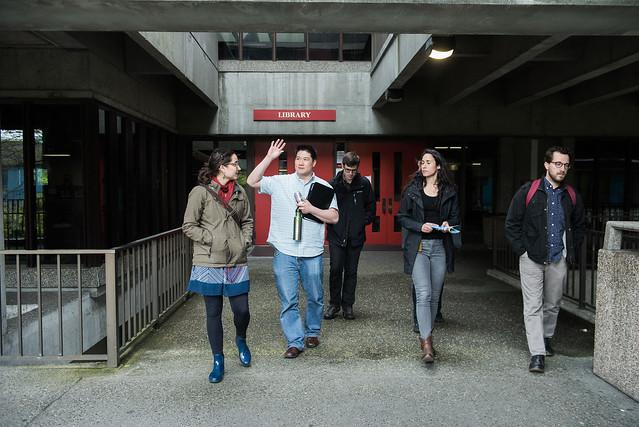
Unlike elite colleges that espouse the ethos of exclusion, weeding out “underprepared” or “underqualified” students, the ideal of community college is to prepare all their students from any background to meet the expectations attached to their academic or occupational calling. While this commitment to access and opportunity is commendable, since many community college students aspire to transfer to a four-year institution, community colleges also have a responsibility to help students develop the requisite skills and knowledge needed to succeed in their next academic endeavor.
My interest in and involvement with the Reaching New Publics program, funded by the Andrew W. Mellon Foundation, stems from my own past experiences as a low-income student of color at a small community college in Mira Mesa, California. San Diego Miramar College not only fostered my love for philosophy and my aspiration to pursue advanced studies beyond the A.A., but also afforded me the opportunity to transfer to UC San Diego to further my philosophical studies and obtain a B.A., through its established relationship with the University of California (UC) system.
But the common experience among students who transfer from community college to four-year institutions is “transfer shock.” Jennifer Smith, another Mellon Fellow, has discussed this phenomenon in a previous post. Transfer shock refers to the difficult transition period that students experience when acclimating to a new academic context. Transfer students not only encounter unfamiliar faculty, campus, and peers, but also new norms and expectations around academic excellence and new cultures of prestige. In my first quarter at UC San Diego, I was enrolled in a philosophy writing course. After introducing myself to the class as a transfer student, my philosophy professor remarked that he typically finds the writing quality of transfer students to be unsatisfactory. In his opinion, transfer students were ill-prepared to write decent philosophy papers at the university level. These types of incidences exacerbated the feeling that I was an ‘outlier’ who did not belong in the department.
Unlike elite colleges that espouse the ethos of exclusion, weeding out “underprepared” or “underqualified” students, the ideal of community college is to prepare all their students from any background to meet the expectations attached to their academic or occupational calling. While this commitment to access and opportunity is commendable, since many community college students aspire to transfer to a four-year institution, community colleges also have a responsibility to help students develop the requisite skills and knowledge needed to succeed in their next academic endeavor.
During my time as a Mellon Fellow, I have met a number of community college professors who have assumed the responsibility of equipping their students with the requisite skills and knowledge to thrive in subsequent academic settings. Last February, I attended a major philosophy conference in Denver, Colorado that hosted “teaching hubs,” or interactive workshops and presentations on teaching philosophy. My mentor, Anthony Ferrucci, who teaches philosophy at South Seattle College and Green River College, presented an assignment designed for his Introduction to Philosophy course. The aim of the assignment was to facilitate students’ understanding of ethical theories by connecting them to provocative scenes or storylines in films, television, comic books, and other forms of media of their choice. Rebeka Ferreira, another Green River College professor that I have come know, held a workshop on her method of teaching students how to write good philosophy papers, which is a version of a writing assignment with a giggle-inducing title, PEE (Present-Explain-Evaluate). Although I do not have the space to elaborate on their innovative assignments, the point is that community college professors are constantly developing new ways to enable their students to do good-quality philosophical work in any academic setting, including universities.
It is also critical for community college professors to acquaint students with the expectations they will encounter at universities. This may include navigating the “unsaid” social expectations and norms that pervade university departments, but may not be familiar to community college students. Anthony Abraham Jack documents how the social aspects of academia can disadvantage historically marginalized students. For instance, Jack reports how many students from disadvantaged backgrounds hesitate to visit their professors during office hours or network with other people because norms of self-promotion are unfamiliar or detestable to them.
At the same time, the burden of caring for students to meet the lofty expectations of four-year institutions should not only fall on the shoulders of community college professors. Rather, university professors ought to be more conscious of certain norms that unfairly disadvantage community college students, and actively work to disrupt them. As Nicole Stevens and others have argued, a departmental culture that focuses on independence can further undermine the academic performance of first-generation college students who emerge from American working-class contexts that are characterized by norms of interdependence. About this, university professors have much to learn from community college professors whose pedagogical approach strives for inclusivity. This is one of the reasons why building bridges between different institutions of higher education is so important.
Paul Tubig (he/him/his)
Paul Tubig was a 2018 Mellon Collaborative Fellow for Reaching New Publics, a 2021 Mellon Collaborative Fellow, and is currently an Assistant Professor of Philosophy at Georgia Southern University.
His research focus is on the intersections of social and political philosophy, bioethics, neuroethics, and philosophy of disability. He is also interested in a wide range of issues related to global justice, race and ethnicity, place and migration, and the ethics of incarceration.
